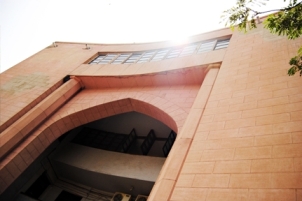 KARACHI, Sept 24: It is important to engage the energies of the young people if South Asia is to prosper and become peaceful. This was the thrust of the arguments eloquently presented by former foreign minister of Bangladesh Dr Kamal Hossain during his talk titled ‘Building a peaceful South Asia responsive to the aspirations of all our peoples’ at an event held in memory of the late revolutionary Fatehyab Ali Khan organised by the Pakistan Institute of International Affairs at the institute’s library on Monday.
KARACHI, Sept 24: It is important to engage the energies of the young people if South Asia is to prosper and become peaceful. This was the thrust of the arguments eloquently presented by former foreign minister of Bangladesh Dr Kamal Hossain during his talk titled ‘Building a peaceful South Asia responsive to the aspirations of all our peoples’ at an event held in memory of the late revolutionary Fatehyab Ali Khan organised by the Pakistan Institute of International Affairs at the institute’s library on Monday.
Dr Hossain started off by paying tribute to the late Khan whom he said he admired at a distance. The late politician was more than a human rights activist; he was in the frontline of the struggle for democracy, he said. From 1958 to 1971, people like him (Dr Hossain) and Fatehyab Ali Khan had common aspirations. He referred to the students’ movement in which he also took part and as a result of which many suffered persecution and went to jail. He said the revolutionary leader struggled for democracy, for justice and for the rights of the ordinary people till he breathed his last. He said today politics was not seen in a favourable light, but in those days people were drawn to politics in the best sense of the word.
Dr Hossain said he’d have liked more young people in the audience because his talk was more about them than anything else. At the time when the late Khan was in the thick of things, young people took a stand for justice. He said youths were the agents of change and they should be questioning their representatives as to why there was injustice, why they were disorganised, what they could do to set things right and what things had let them down. He reiterated that change could only be brought about by the younger lot. This was the strategy that US President Obama used during his election campaign and in the last election in Bangladesh one-third voters were from that age bracket which made a huge difference and left a lot of people staggered.
Dr Hossain said there were issues that needed to be resolved (like the kind of money used in the elections), because people were uninformed or misinformed. Here the role of the media was of the essence to provide them with correct information, he said. He added that one had to look back and learn from experiences in order to look forward. “It’d been 65 years since we gained independence but we are to date looking for a future in which there would be rule of law, independent judiciary and good governance.” He touched on the issue of equal opportunity and said before the 1970s, 56 per cent of country’s population lived in East Pakistan. “In the ‘70s we started afresh.” He lamented the level of poverty and the asymmetry that existed between the provided-for and the disadvantaged in South Asia.
Dr Hossain iterated election promises always had the same factors related to real change and development but they’re seldom fulfilled. He argued that one needed to see whether basic issues such as access to food, health and education had been addressed. He quoted from a 2007 UNDP report on South Asia which had discussed in detail the challenges the region was faced with. According to the report, there was intense form of poverty in South Asia and health-related matters (such as high infant mortality rate and highest number of TB patients) were still unresolved.
He said that instead of blaming the British, who had left 65 years back, for everything, the energies of young people must be utilised. “We will not change unless you participate,” he noted.
“Power belongs to the people. They have the right to judge what their representatives are doing. They represent you, you must ask them the right questions,” he emphasised.
He again highlighted the role of the media and termed it critical. He told the audience that in some countries the media had already begun to play its part, while in some other countries it was controlled. He reiterated that if the young people didn’t come forward, no one would do anything for them. He said now that anybody above the age of 18 could vote, things were more viable for them. Today’s students were brighter than the students of the 60s, because they had access to information, he observed. “They must come out.” He said though there was no substitute for democracy, it meant much more.Dr Hossain said South Asia had huge natural resources but they were not fully harnessed. There was a need for regional cooperation. He said after Bangladesh gained independence Zhou Enlai suggested there should be a commonwealth of South Asia. He said the movement of Saarc was slow, because there were doubts and historical legacies, but time had come to put that behind. There should be regional centres now, for example the South Asia Institute of Advanced Medicine, because it was a common problem, he added.
Earlier, PIIA chairperson Dr Masuma Hasan introduced Dr Hossain to the audience and also spoke about Fatehyab Ali Khan.
Note: Originally published in Dawn, see here.







